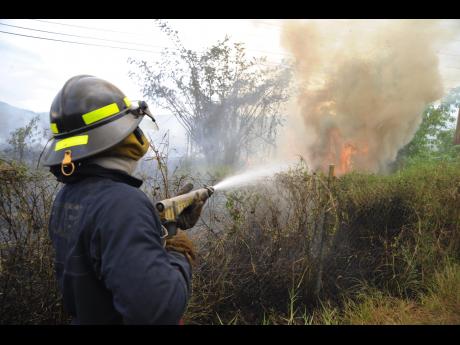Raging anger, burning cane - Illicit fires cremating the life out of critically ill industry
Jamaica's critically ill sugar industry is being pushed closer to its grave by persons who continue to illicitly burn the cane fields.
It is a practice which baffles Allan Rickards, chairman of the All-Island Jamaica Cane Farmers' Association, who used a Gleaner Editors' Forum last Wednesday to express his frustration at farmers, contractors and other stakeholders, particularly in Westmoreland, who are "willingly tying their own nooses".
"I say to you, as I say to my colleagues in Westmoreland, we are our own worst enemies in many respects; because if we were not a part of that problem, we would be more firmly placed as a part of the solution," declared Rickards.
"I am in deep sympathy for anybody who has to manage a factory in Westmoreland. As we speak, upwards of 60 per cent of cane delivered to the factory is being burnt illicitly," added Rickards.
"When you can tell me that somebody wants to take a trip overseas and deliberately burn their cane so it can be reaped, even though they know it is a month or two young and it will affect the price.
"When you will tell me that somebody will burn cane because it is Christmas time and they don't want so much to spoil the view around their house.
"When you will tell me that people burn cane because they quarrel with their neighbour whose cane they are not burning, and that 19 or 20,000 tonnes of cane was burnt down because the police arrest the bike taxi man them that operating illegally, I can only say to you that suicide is not uncommon in this country," added Rickards.
FINANCIAL LOSS
Jamaica is said to be losing millions of dollars each month due to the illegal burning of sugar cane, with many of the cases reported in Westmoreland.
In one weekend last February, more than 39,000 tonnes of sugar cane was set ablaze in different sections of the parish, sparking major concerns from the agriculture ministry.
At that time, the ministry said it was working with the Sugar Industry Authority and the Sugar Company of Jamaica Holdings to sensitise the persons in Westmoreland about the value of the sugar industry to that parish and the country, and the inherent dangers of setting fire to the cane fields.
But Rickards said that has had little or no impact.
"No public-education campaign is going to have any effect among people who know what they are doing," said Rickards.
"I cannot understand the logic," added Rickards as he noted that much of the cane burnt illicitly is not ready for reaping and this affects the selling price.
According to Rickards, cane reaped before time also jeopardises the efficiency of the factories.


